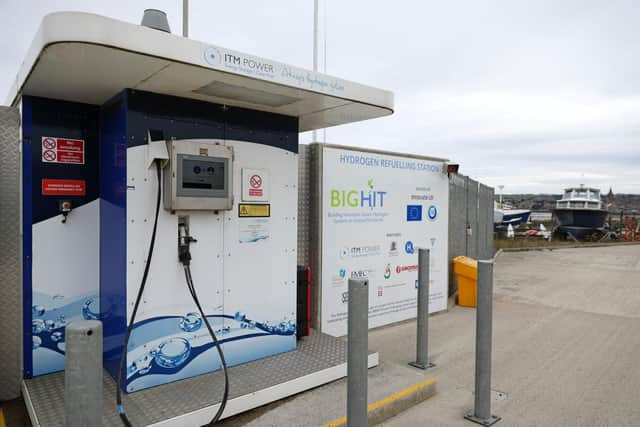Collaboration is required to make hydrogen a reality for Scotland - Jeremy Grant
The campaign, paid for by the UK Government, is designed to promote the £937 million in projects across Scotland that are being funded by Westminster, including the creation of “green freeports” at the Firth of Forth and Inverness and Cromarty Firth.
When these locations were revealed in January, the UK Government announcement made a point of saying it had worked in collaboration with the Scottish Government to select them for freeport status, which comes with tax and customs breaks to attract companies to invest in renewable energy infrastructure.
Advertisement
Hide AdAdvertisement
Hide AdOf course, the settled narrative about the relationship between Holyrood and Westminster is rather different. Sometimes it is dysfunctional, especially when the issue turns on whether a matter is reserved or devolved.


Yet in the area of renewables, which is so important to Scotland and the UK’s shared future in an era of geopolitical fracture and energy security, it is vital that the two governments collaborate far more than they have been doing hitherto. Especially when it comes to offshore wind and hydrogen and the associated infrastructure needed to make it all happen – electricity grid and port upgrades, supply chains and so forth.
On hydrogen, the UK and Scottish governments are pursuing what the House of Commons Scottish Affairs Committee described in a March report as a “twin track” approach, based on different net zero target dates of 2050 and 2045 respectively. And there are different production targets for hydrogen: 10 gigawatts (GW) by 2030 in the case of the UK, and 5GW in the case of the Scottish Government.
The committee’s report noted that the two governments “arrived at their respective low carbon hydrogen production targets independently of each other, and we are unclear how the two targets align and whether either is achievable”.
It then asked the two governments to provide “a proposed timeline setting out key milestones on the road towards the respective targets to assist us and our successor committees in judging progress and evaluating the achievability of Scotland’s hydrogen production targets”.


Meanwhile, the Scottish Government has been assiduously courting Germany, knowing that Europe’s largest economy needs hydrogen to replace Russian gas and as Berlin shuts down nuclear. Under a hydrogen “action plan” drawn up by Holyrood a year ago, Scotland is to become “a leading producer and exporter of renewable hydrogen” generated from vast offshore wind farms in the North Sea.
Scottish Government rhetoric around hydrogen sometimes comes across as if it’s being viewed as a “national asset” that will eventually replace oil and gas in strategic importance. The bottom line is that hydrogen policy is complex, cutting across reserved and devolved competencies.
And at a Scottish Affairs Committee hearing in June, there were pointed questions for UK ministers about the extent to which they were liaising with Scottish counterparts on hydrogen.
Advertisement
Hide AdAdvertisement
Hide AdEarlier this month, the UK and German governments signed a high-level energy partnership that includes hydrogen. It’s unclear where collaboration between the UK and Scottish governments fits in. But it will be needed if any of this is to attract the private capital needed to make hydrogen a reality.
Jeremy Grant is a freelance writer and editor, and was a journalist at the Financial Times and Reuters for 25 years
Comments
Want to join the conversation? Please or to comment on this article.